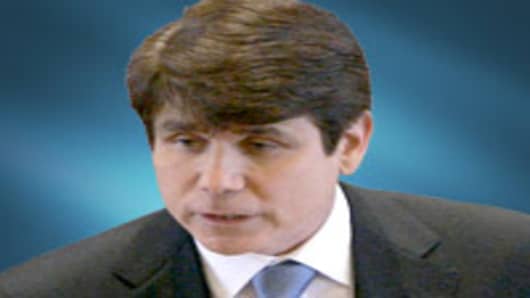“I’m still governor for now, and I say you take the afternoon off!” he cheerily told employees, many of them tearful. At another point, he pondered the more practical consequences of losing his job. “I wonder if we’ll have to hitchhike home,” he said. “Maybe we could take the bus.”
In the end, he left the Capitol in Springfield through a secret basement corridor full of grunting, clanking pipes, bare walls and puddles.
Mr. Blagojevich, who was arrested Dec. 9 on corruption charges, including an accusation that he tried to sell the Senate seat vacated by President Obama, had first refused to take part in his impeachment trial. Instead, as senators met in Springfield this week, he set forth on a campaign of appearances on national television talk shows to proclaim his innocence. Then, on Wednesday, he announced that he wished to make a “closing argument” in the trial he had mocked on show after show.
So on Thursday, he set off on a six-hour trip from his home on this city’s North Side to the Capitol and back again, allowing a reporter and a photographer for The New York Times to accompany him at the newspaper’s expense.
At moments during the day, Mr. Blagojevich reflected on what was ahead, most immediately how best to pay his mortgage come March 1 without his $177,000-a-year salary. He spoke of the guilt he felt toward his family for entering a political life, the “personal Greek tragedy” that he said he saw as his circumstances, and, all the while, his love of his job. His biggest error, he said, was the friends he had picked.
“I come out of the alleys of Chicago politics,” said Mr. Blagojevich, 52, who entered Democratic politics in 1992, first as a state representative, then a United States representative. “That’s a tough place. The politics there is not motivated by idealism or high purpose. It’s nuts and bolts, and you scratch my back, I’ll scratch yours. I came up that way.”
Mr. Blagojevich, who began the morning tracked by news helicopters following his sport utility vehicle’s every turn en route to the airport, said he lately had been trying to remember how to be a regular person. Not long ago he made the state troopers who drove him let him take the wheel; he had last driven six years ago. He said he tried to sneak out through a neighbor’s back fence for a jog without his security team, wanting to know what it felt like.
In Springfield, as he waited to speak to the State Senate, Mr. Blagojevich sat in silence in his chandeliered office not far from the impeachment hearing room, nervously jiggling a leg and jotting changes to the speech he had written overnight in longhand on graph paper. He repeatedly called his wife, Patti. He carried his black hairbrush (the one he is known for insisting be available at all times) to his private bathroom behind a heavy wooden door. Minutes before he was to appear on the Senate floor, Mr. Blagojevich stood up and told an aide: “Let’s go home. Screw it. It won’t matter.” Then he walked out and made his speech.
In his speech and throughout the day, Mr. Blagojevich spoke to anyone who would listen of the unfairness of the removal he was facing, one he considered absurdly outside the boundaries of the nation’s laws and mores. The Senate was considering criminal accusations that had yet to be tried and on which no witnesses could be called as part of an agreement with federal prosecutors. And the senators were judging him on official acts like trying to buy flu vaccines for the state and to help people buy cheaper prescription drugs, acts that, he said, had only been efforts to help people.
After his speech, he asked aides how he had done. He called his wife and asked her. None of it, he said, would matter, predicting correctly that he would receive a “shutout” vote. Then he asked aides once more how he had done.
“Well, baby, we’re out of here,” he said to Louanner Peters, a deputy governor. His entourage hurried him toward his S.U.V. and the airport, reminding him that time might be ticking on those vehicles. He shook hands with workers on the airfield, state troopers and the pilots.
On the plane, he took a front-facing seat on the left side, his regular spot, “for old time’s sake,” he said.
“We should have been more selfish, not selfless,” he said. “It sounds probably perverse for me to say that based on what some people are saying about me. But it’s true. My family, we didn’t take advantage of all these things that people do. My successor has done a whole bunch as the lieutenant governor — taken all kinds of trips all over the world and trade missions — like he’s got anything to do with anything as lieutenant governor.”
By the time he landed in Chicago, before 2 p.m., senators still had yet to vote, so the caravan of state vehicles met him at the plane, as always, to drive him home. He said he had no plans to listen to the deliberations or wait for a vote. “Curious to hear what?” he said. “I know what they’re going to do.” The governor said he was planning to go for a jog in the snow.
Mr. Blagojevich said he had no intention of making a fuss over packing up and leaving the governor’s offices. Still, he hinted that he might yet fight the removal, somehow, perhaps even in court.
“Look,” he said. “I always think creatively. I don’t give up.”


